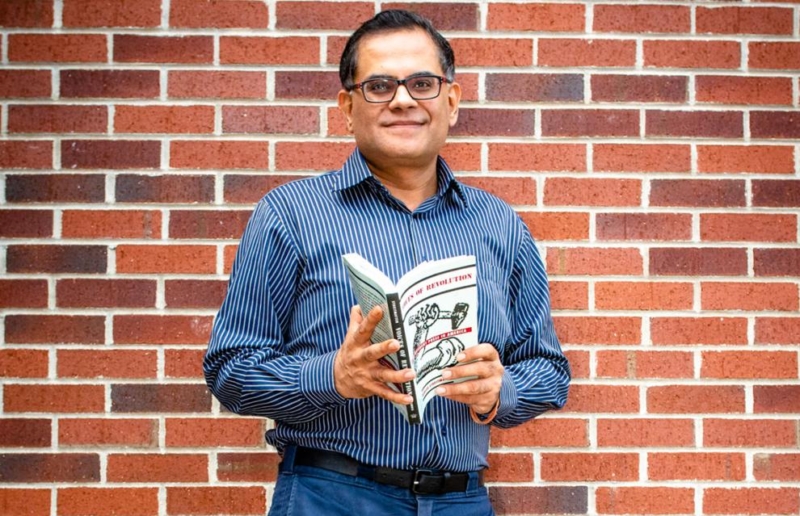September 30, 2018: Park’s New Perspective
Over the summer, Ithaca College appointed Raza Rumi, a Pakistani journalist, author, and policy analyst, as the new director of the Park Center for Independent Media (PCIM). Rumi will succeed the program’s previous director, Jeff Cohen, who retired from Ithaca College this summer after founding the PCIM in 2008. The Ithaca Times sat down with Rumi to discuss his appointment and what he brings to the position. Responses have been edited for clarity and brevity.
Ithaca Times: How did you learn about this position? Why were you attracted to it?
Raza Rumi: I learned about it from the Ithaca College website, of course, and also through my predecessor, the former director Jeff Cohen. I used to teach at IC, before: I was here as a scholar-in-residence for two years from 2015 to 2017, and then I taught in the journalism department. So I knew Jeff Cohen and the work of the center, and used to interact with them fairly regularly. What drew me to the PCIM is the fact that it’s an exciting venue. It’s a unique center—one of its kind in America. It works with the students and the faculty, and the college itself, but also engages with the outside world.
IT: What do you see as the purpose of the PCIM? What is its goal?
RR: It was created a decade ago, and its purpose was to connect the students with the independent media producers. So, [that means] all of the media outlets which are outside of the corporate control, and which produce really hard-hitting journalism and speak truth to power. PCIM attempts to familiarize the students with that. In addition, there are courses on independent media, and we also have an IZZY awards series where each year we honor outstanding independent journalists in the U.S. [The awards are named after independent investigative journalist I.F. Stone.] IC students also intern with indie outlets. And so, the idea is to promote and engage with independent media.
IT: Do you think independent media has certain influenceand abilities that corporate funded journalism can’t match?
RR: Yeah. I think independent media outlets are largely either run through donations or subscriptions. There is advertising as well but not at the scale seen in mainstream press. They have greater freedom to challenge the powerful actors and interests in the country, and also pick up the stories which the mainstream corporate media does not pick up. So, that’s a big difference and it changes the nature of journalism.
IT: What are your responsibilities as director? What is your role?
RR: My role is to lead and manage the activities of the center. I teach a course around the issues of independent media. I am supposed to organize talks, symposia and other events, including the IZZY award. I’m already working with IC students on some research projects with a view to regularly produce and disseminate research materials.
IT: You came to Ithaca College in 2015. What is your professional experience, primarily in communications, prior to arriving in Ithaca?
RR: I’m originally from Pakistan, and I was a journalist there. I have also worked as a policy analyst and international development practitioner. I’ve been editing the national newspaper called The Daily Times, and I was also an editor at The Friday Times, a weekly liberal magazine in Pakistan. Furthermore, I have been a TV commentator and a talk show host. I moved here in 2014 to the United States, and I was initially in [Washington] D.C. where I was a fellow at the New America Foundation and the United States Institute of Peace.
IT: You mentioned public policy and government. What did you do specifically in that area?
RR: Before I became a full-time journalist, I used to work for international organizations such as the United Nations and [the] Asian Development Bank. I started my career as a civil servant in Pakistan. So, I have that whole experience behind me (which has helped in framing my classes at Cornell Institute for Public Affairs where I have been a visiting faculty since 2016.) In the early 2000s, I started writing for magazines and newspapers, and loved it. The feedback I received was even more encouraging, and I thought, “Okay, let’s switch and change the track because all of these jobs are great, but they do not allow me the freedom to express myself.”
IT: In 2014, you survived an assassination attempt by a militia connected to the Taliban. If you’re comfortable speaking about it, what happened?
RR: What basically happened was I had been writing before that for quite some time—for almost a decade—but once I went on TV, which has a huge audience, I said what I believed in and I did not really care too much about what should be said or not said. My voice was progressive and secular and it angered some. So, the religious extremists—whom I used to challenge, constantly shunned violence in the name of religion. Some of these extremists thought that I was perhaps too ‘liberal,’ and I was advocating secularism, so they just tried to kill me. In Pakistan, the state has also backed such fanatics so the lines are blurred.
IT: What do you bring from you past work—your knowledge and experience in other parts of the world—to this job that’s unique?
RR: What I bring is a mixture of journalism, and public affairs, policy research and management experience. I also bring in an international dimension: Over the years, I want to expand and make the center a little more globalized. I know it sounds clichéd but I also bring the perspective of a person of color, an immigrant. In short, I do have that different way of looking at America and the world without rejecting the mainstream.



